- Home
- Steve Hockensmith
Dreadfully Ever After Page 11
Dreadfully Ever After Read online
Page 11
“Perhaps the slightest bit of worry, or at least caution, would be in order,” Darcy said. “I am in no condition to defend us should any unmentionables avoid Lady Catherine and her traps, and you … well …”
“I am a weakling untrained in the ways of death,” Anne said. For some reason, her smile grew.
“I would not have used those words.”
“Surely, I captured your sentiments, though.”
They were heading down into another ravine, and the light grew so murky that Darcy was no longer certain they were on a trodden path anymore. Yet Anne walked with such a sure step, Darcy found himself carrying on beside her.
“Anne,” he began.
“Tell me, Fitzwilliam,” his cousin cut in. “Is that what first drew you to Elizabeth Bennet? Her skills as a warrior? Lady Catherine disparages them, but I can tell when she’s talking simply to convince herself. Your wife’s talents must be quite formidable for her to have withstood Her Ladyship’s wrath.”
“Elizabeth is a great warrior. Or was a great warrior. She’s given all that up now, of course. But, no. That is not what intrigued me. It was her spirit. Her wit. Her intelligence. Her strength of character.”
He almost stopped there. The conversation was already going places that made him uncomfortable. He couldn’t help but add one more thing, however, because he’d been thinking of it much, and it was true. It bolstered something within him to say it aloud.
“And her beauty, too, of course. To be honest, it was that which I noticed first.”
Anne laughed softly. “Oh, Fitzwilliam. You say that as though it’s something to be ashamed of. All it really means is that you are a mortal man, after all. Flesh and blood instead of a paragon of virtue up on a pedestal. Your wife, on the other hand, sounds like quite the goddess! Is there any positive quality she doesn’t possess, by your reckoning?”
“None I can name.”
“Perhaps you lack my vocabulary.”
“Do you accuse my wife of something?” Darcy snapped.
“Oh, no. Certainly not. How unfair that would be when she is not here with us to defend herself.”
And there it was: the accusation made without being spoken. The list of Elizabeth’s virtues was long, indeed, but the benefit of every one she was denying her husband now, for she’d sent him far from her at the very moment he needed her most. He didn’t even have the cold comfort of a letter inquiring after his condition. No word from Derbyshire had reached him in the week he’d been at Rosings.
They were at the bottom of the gully now, and Darcy stumbled over rocks and twisted roots he couldn’t see.
“If you’re not ready to go back, at least let us walk where there is more light.”
“Light is overrated,” Anne said. “One misses so much when confined to it. Take this, for instance.” She stopped and did a spin. “This is my favorite place on the whole estate.”
“It is?”
All Darcy could make out was a small, dim glade that was remarkable only for a looming outcropping of stone that bordered it on one side.
“It’s so wonderfully still here,” Anne said, her voice hushed. She kept moving in a slow circle, her arms spread wide. “So tranquil. Especially now, at dusk. Does it seem to you sometimes that night and day are at war? That one must always obliterate the other? Here, now, however, it is neither night nor day. There can be something in between. There can be peace. That is why I love it here. It makes me feel … safe.”
She stopped, facing Darcy, just as a breeze swept into the ravine and stirred up an all-too-familiar stench.
“Anne …”
Darcy heard a low, growling groan to his right—from the wall of stone that jutted up ten or twelve feet into the air. He turned toward it, squinting, and saw that the rock face wasn’t as sheer as he’d first thought. There was a black crack in its center partially hidden by a mossy rise in the earth. It was perhaps six feet tall by three wide. The same size as a doorway. A path wound out of it—the kind worn into the ground by heavy, shuffling feet.
“We must go. Quickly,” Darcy whispered.
“Oh, I think it’s too late for that,” Anne replied.
There was movement in the fissure—a blackness stirring within the blackness. Within the cave, Darcy now knew.
“Do as I do,” Anne said.
She stepped back a few paces, raised her hands in the air, spread her fingers wide, and gazed off at nothing.
“Be a tree.”
“What?”
“Be a tree,” Anne said. “Or be supper.”
The reek of rotten meat was overpowering now. The solitary groan had become a chorus. Darcy was too weak to fight, too blind to flee.
He brought up his hands and became a tree.
The first dreadful to stagger out of the cave moved slowly and awkwardly, even by zombie standards. Some mishap had twisted its head around on its neck so that it had to walk backward to see where it was going. It had been a woman, and it occasionally tripped on the hem of its tattered skirts. Its flesh was gray and frayed, its lidless eyes so wide they looked like they might fall from their sockets. Yet there was no sign it saw Anne and Darcy. The creature simply shuffled between the two “trees” and carried on out of the gully.
The next dreadful did the same, and the next, and the next. There were fourteen in all, some old, some fresh. One was still gnawing with literal absent-mindedness on an arm that had been torn from the zombie before it. Another seemed to be little more than strips of gnarled leather spackled here and there with matted fur. It looked like it had spent the last millennia pickled in a bog.
All the unmentionables had one thing in common: Darcy could see in them no hint of the spark that drew him to living things. Instead of light, they had at their core gray smudges of nothing.
As each one tottered past, Darcy silently repeated his new mantra: I am a tree. I am a tree. I am a tree. I am a tree.
And the zombies seemed to believe it. Or to find him unworthy of their attention, at least. Once the last one was past him, Darcy let himself breathe a sigh of relief.
He’d forgotten for a moment that trees don’t sigh.
The dreadful at the back of the line turned and came toward him.
It was a male of perhaps thirty years of age when it had died—that death having taken place some weeks past, to judge by the putrefaction. It had upon it not a single stitch of clothing to hide the advanced state of its decay or to stifle the attendant odors thereof. Its skin was black, its limbs bloated, its burst belly a cornucopia of dangling viscera.
It stopped directly in front of Darcy and stared at him with eyes ringed by writhing maggots.
I am a tree. I am a tree. I am a tree I am a tree.
The unmentionable leaned in close, and something rough yet moist moved up Darcy’s neck. It was only after the zombie turned and lurched off again, growling, that Darcy realized that the something had been a tongue.
The dreadful had tasted him and found him not to its liking. All the same, Darcy waited a long, long time before sighing again.
“I told you this place was special,” Anne said.
She was no longer a tree. She was a woman again.
One who was laughing.
CHAPTER 18
The day after Sir Angus’s call on the Shevingtons, a servant arrived bearing a note from him.
Dear Mr. Shevington:
My son tells me that your family is new to London. I propose, then, that a tour is in order. I hope you will allow me, an immigrant to this great city myself some years ago, to be your guide. It would go some ways further, I feel, toward making amends for the presumption and rudeness you might still associate with the name MacFarquhar. Send word if you intend to accept my offer, and my son and I will collect you and your daughters at a time of your choosing.
Your humble servant,
Sir Angus MacFarquhar
“You were right about having him in the net,” Nezu said to Mr. Bennet.
“So it wou
ld seem. Shall we begin hauling him in?”
Mr. Bennet turned to Elizabeth. She nodded.
Four hours later, the MacFarquhars were in front of the house in their open-topped landau. Mr. Bennet and Elizabeth and Kitty joined them as a glummer-than-usual Nezu—who, try as he might (and did), could offer no valid excuse for accompanying the party—watched from the portico. Mary, meanwhile, lurked out of sight inside. At first, Elizabeth had feared she might want to come along as a heretofore unseen Shevington. Instead, she’d announced her intention to spend the day “meditating on the other ways I might prove myself useful.”
“Splendid, my dear, splendid,” her father had said, and it was obvious to Elizabeth that, in his mind, the greatest use Mary could make of herself was to keep on meditating—preferably in a closet—until their unsavory business in London was done.
Unfortunately, it wouldn’t be concluding anytime soon. As the driver guided the MacFarquhars’ landau through the streets, it quickly became apparent that he was taking them southwest. They were headed back to the more fashionable, well-protected sections far from the city’s fringes. Which meant they were headed away from Bethlem Royal Hospital. Sir Angus’s laboratory wouldn’t be on the tour.
Mr. Bennet noticed, too—and, unlike Elizabeth, couldn’t resist commenting on it.
“I’ve been told, Sir Angus, that you’re one of the administrators of the famous ‘Bedlam’ Hospital. I do hope a visit is on today’s itinerary.”
“The days when one could come in and gawp at the Bedlamites arrre done,” an icy Sir Angus replied. He hadn’t been particularly warm before then, either, though Elizabeth suspected his chilly disposition had less to do with his guests than with Bunny’s giggly fawning over Kitty and the miniature coat, cravat, and trousers in which his son had dressed Brummell that day. “The hospital’s no longerrr open to the public. At any rate, it’s in Section Twelve Central. And if you’d everrr been there, you’d not wonderrr why I don’t take you and your daughters there today.”
Mr. Bennet clamped his lips together in a way that promised not another word would be said on the subject. Satisfied, Sir Angus launched into a detailed history of the watch towers scattered along St. John Street Road. His travelogue expanded to include each wall, moat, and gate they passed, and he even (delicately, of course, and employing much in the way of metaphor) talked about the extensive new sewer system that had been necessary when so much of the city was cut off from the river it had for centuries used as its communal chamber pot.
Despite his incessant stream of trivia, Elizabeth didn’t think Sir Angus a bore. He struck her more as a man who took his obligations seriously: He’d promised them a tour, and by gad he was going to give them one. Elizabeth heard little she didn’t already know, yet she wasn’t annoyed. In fact, she came to find the low, growling roughness of Sir Angus’s rolled R’s strangely soothing, like the purring of an especially large cat.
Kitty, on the other hand, could have learned a great deal had she been paying the slightest bit of attention. She and Bunny were facing each other, and the two quickly fell into whispered jokes and half-muffled giggles that were interrupted only when Bunny wanted to point out a favorite shop or lift Brummell for a friendly wave of the paw at an acquaintance in another carriage. Sir Angus and Elizabeth and Mr. Bennet ignored them with the same studied obliviousness that falls over a dinner party when the host makes the sort of noise people of good taste insist doesn’t exist.
The two separate parties—Sir Angus and Elizabeth and Mr. Bennet, Kitty and Bunny and Brummell—splintered even further when the tour reached its climax: the Vauxhall pleasure gardens in Section Four South. Bunny dragged Kitty and Brummell off toward one of the far arbors, where a hot-air balloon would be making an ascent into the dingy-dull late afternoon sky. Mr. Bennet, meanwhile, feigned enchantment at the sound of Handel floating through the air, and he drifted off toward the orchestra pavilion looking as entranced as any sailor hearing the siren’s song.
At last, Elizabeth was alone with Sir Angus … alone with her prey, she couldn’t help thinking. It filled her with such sudden, overpowering self-loathing, every conversational gambit she’d concocted was forgotten. To lure this man into a dalliance would only confirm everything Lady Catherine ever accused her of. So she simply strolled silently by his side, thinking of Darcy, trying to draw from her love for her husband the strength she needed to both betray and save him.
Up ahead, Bunny and Kitty were pausing by one of the gurgling cascades dotting Vauxhall’s tree-lined paths. Bunny jammed a hand into a pocket and threw a handful of coins into the water. Some witticism apparently followed, for so, too, did a “Ho!” from the young man and a “La!” from his female counterpart.
Elizabeth was aiming an appraising glance over at Sir Angus just when he pointed one at her. Their eyes met, and they both smiled ruefully.
“I am not a betting man, Mrs. Bromhead,” Sir Angus said. “But I would wagerrr that you and I were just searching for the same thing.”
“And did you find it?” Elizabeth asked.
Sir Angus tilted his head this way and that, as if examining her face from a variety of angles.
“Around the mouth a little, maybe. And the ears. Otherrr that that, no. No family rrrresemblance at all.”
“Avis takes after my mother … in more ways than one,” Elizabeth said. She cocked her head as Sir Angus had, making a careful study of the man’s wavy gray hair and prominent forehead and strong, blocky features.
“You can look all you want,” Sir Angus said. “You won’t see much of Bunny in me. It’s as with your sisterrr. He’s his mother’s child. He is his mother, rrreally.” His smile, not large to begin with, faded to nothing. “When my son came into the world, my wife’s soul left it, and thus some balance was rrretained. God knows, His creation couldn’t have survived the two of them at once.”
“Your wife was a … formidable individual?”
“Formidably silly, yes. And formidably beautiful. It’s a combination that often appeals to a man, when he’s still young and silly himself.”
Sir Angus looked off again at Bunny and Kitty. The balloon ascent had apparently been forgotten, for they were still by the little waterfall, Kitty cackling as Brummell (with some help from Bunny) tossed another coin into the foam.
“In that way, perhaps, there’s a bit of me in Bunny, afterrr all,” Sir Angus said. He glanced over at Elizabeth and smiled again, warily this time. “If you’ll pardon my saying so.”
“You can have my pardon if you want it, but it isn’t needed. I take no offense. My sister is spectacularly silly. You merely speak the truth, without artifice. I find that admirable in a gentleman.”
Sir Angus offered Elizabeth a small bow.
“Since you praise forthrightness, I hope I may say without being thought overrrbold that I feel the same admiration for plain-spoken ladies.”
“You may.”
“Then I do.”
A tittering couple suddenly darted between them, separating them before veering off onto one of the shadowy “dark walks” that were, Elizabeth knew, so popular with young lovers seeking privacy. The little shrubbery-shrouded path was even darker than usual, for dusk wasn’t far off, and attendants had only just begun lighting the thousands of paper lanterns strung throughout the gardens. The couple faded into the murk, their silhouettes merging as a final, lecherous laugh echoed out of the gloom.
The interruption seemed to sober Sir Angus, for when he resumed conversation, he did so with a somber expression and a very different subject.
“I understand your fatherrr is an industrialist of some kind. Has he experimented with Zed laborrr, as have others in the north?”
“No, though he sees potential profit in it, of course. What factory owner wants workers who insist on sleeping and eating and who complain when ground up in the gears? He hasn’t brought in any unmentionables, however … largely because I won’t stand for it.”
“You object on the same gr
ounds you disapprove of the rrraces?”
Elizabeth nodded. It wasn’t hard to feign a silent upswell of emotion. In fact, when she thought of Darcy and what some would do to him, if they could, she wasn’t feigning at all.
“I wonderrr, Mrs. Bromhead,” Sir Angus said, watching her in a way that suddenly seemed wary and calculating, “are you a memberrr of the Society for the Prevention of Cruelty to Zed-dash-dash-dash-dash-dashes?”
Elizabeth stifled a bitter laugh. Few in England had shown the dreadfuls less mercy than she.
“No. The SPCZed goes too far. I accept that the unmentionables must be dealt with firmly. Decisively. Yet that doesn’t give us the right to … is something wrong?”
Sir Angus wasn’t looking at Elizabeth anymore. He was scowling at something just off the path they’d been sauntering along. Elizabeth followed his angry gaze.
Bunny and Kitty, she saw, had joined a small group of young men in a circle of crumbling Doric columns—faux-Roman ruins that had been installed in the gardens a few years earlier. The gentlemen were all dressed as stylishly as Bunny, though the styles varied wildly. In fact, that’s what seemed to separate them. The young bucks closest to Bunny (several of whom Elizabeth recognized from his lark with the zombie) wore trousers and frock coats and boots tailored in snug, straight lines and sober hues. The men facing them, by contrast, were adorned with so much frillery—large, lacy cuffs and powdered wigs and morning coats of pink and purple satin—that any one of them, with just a few alterations, could have passed for a Parisian courtesan.
The two groups were lined up like skirmishers facing each other on the battlefield. Elizabeth couldn’t hear what any were saying, but the way the men alternately glowered and laughed told her insults were being volleyed back and forth.
“Such foolishness,” Sir Angus grumbled as he stomped toward them. “With all the turmoil in the world, they have to create morrre out of buttons and silk.”

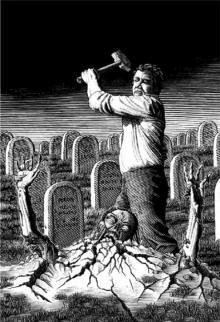 Dawn of the Dreadfuls
Dawn of the Dreadfuls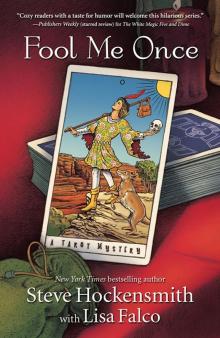 Fool Me Once: A Tarot Mystery
Fool Me Once: A Tarot Mystery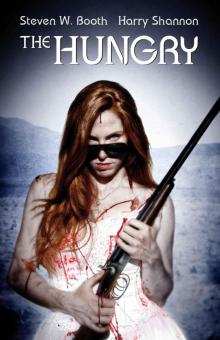 The Hungry
The Hungry Naughty: Nine Tales of Christmas Crime
Naughty: Nine Tales of Christmas Crime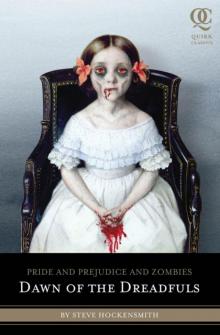 Pride and Prejudice and Zombies: Dawn of the Dreadfuls papaz-1
Pride and Prejudice and Zombies: Dawn of the Dreadfuls papaz-1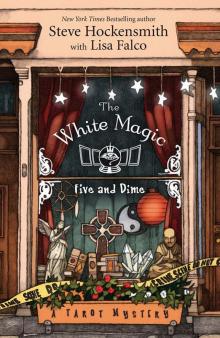 The White Magic Five & Dime (A Tarot Mystery)
The White Magic Five & Dime (A Tarot Mystery)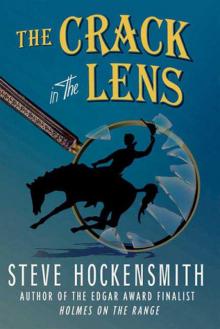 The Crack in the Lens
The Crack in the Lens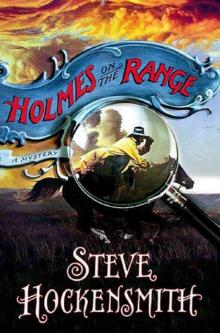 Holmes on the Range
Holmes on the Range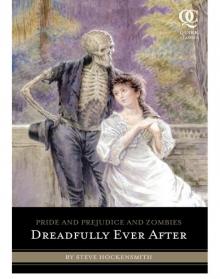 Dreadfully Ever After
Dreadfully Ever After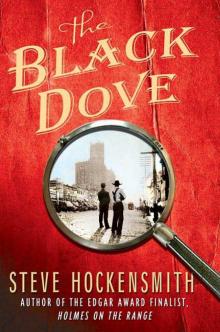 S Hockensmith - H03 - The Black Dove
S Hockensmith - H03 - The Black Dove On the Wrong Track
On the Wrong Track Naughty-Nine Tales of Christmas
Naughty-Nine Tales of Christmas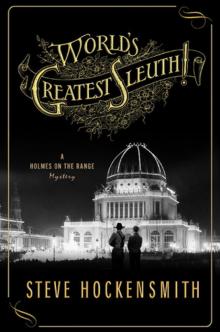 World's Greatest Sleuth!
World's Greatest Sleuth!